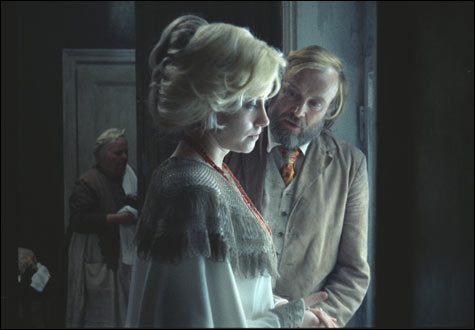
UNCLE VANYA Andrei Konchalovsky's adaptation isn't funny enough, but it has a lot of feeling and some excellent performances. |
Given that every theater season seems to bring a new production of a Chekhov play, it's surprising that so few movies have been made of his dramas, or of his short stories. Or maybe not so surprising: Chekhov is perilously difficult for filmmakers — though some of the greatest movies ever made could be called Chekhovian (Jean Renoir's The Rules of the Game, Ingmar Bergman's Smiles of the Summer Night, Satyajit Ray's The Music Room and Days and Nights in the Forest), and others offer Chekhovian moments (the bankrupt aristocrat's farewell to his lost estate in Bernardo Bertolucci's Before the Revolution is straight out of The Cherry Orchard).
You might expect the sublime Louis Malle–Andre Gregory Vanya on 42ndStreet to be part of the Museum of Fine Arts' "Celebrating Chekhov" series, or Laurence Olivier's fine, forgotten film of The Three Sisters, but you won't find them. This collection is strictly Russian, and the seven movies are obscure: versions of Uncle Vanya, The Seagull, and Chekhov's earliest play, Platonov, and of a smattering of his stories.
It's instructive to see how Russian filmmakers handle material we're so used to seeing rendered by Americans and Brits, and some of the choices are unpredictable. (THE SEAGULL, which screens January 27, and A HUNTING ACCIDENT, set for January 29, were unavailable for preview.) For example, Andrei Konchalovsky's 1970 UNCLE VANYA (January 28 and 29) cuts a few quite famous moments — like the end of act two, where Sonya and her stepmother Elena, who have reconciled after weeks of unexplained tension, are prevented from playing music together by Sonya's insomniac father. Chekhov probably wouldn't have cared for this version of his drama; it isn't funny enough to suit a playwright who was driven to fury by Konstantin Stanislavsky's refusal to treat his work as comic, and the big ensemble moments are awkwardly staged. And of course, we've been spoiled by Vanya on 42ndStreet. Still, Konchalovsky's film has a lot of feeling and some excellent performances, especially Innokenti Smoktunovsky's as Vanya (he has a wasted handsomeness — you understand why he believes he might once have won Elena's love) and Irina Kupchenko's as Sonya. In the scene where Sonya feeds a late-night snack to Dr. Astrov (Sergei Bondarchuk, with his rugged movie-star looks), she attends to this man, who has no idea she loves him, with delicate rapture, her cheek resting on her folded hands, gazing into his eyes as if looking for the reciprocal affection she hopes to find. When she secures from him a promise (quickly broken) that he won't drink anymore, she trades on a camaraderie she's praying is just a step away from love. It's a beautiful piece of acting. And as Elena, Irina Miroshnichenko has a slightly remote, Julie Christie–like glamour.